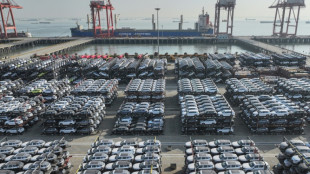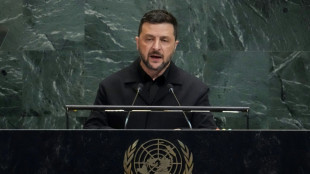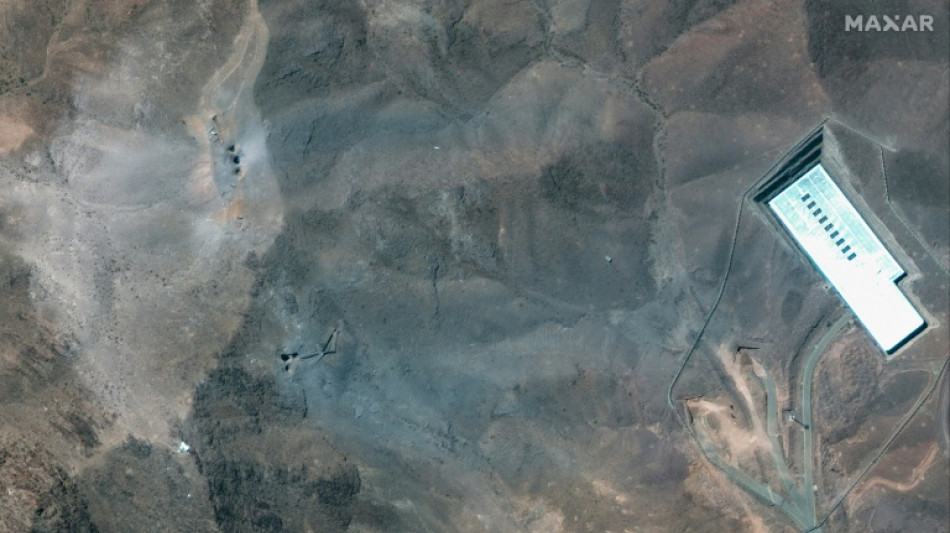
-
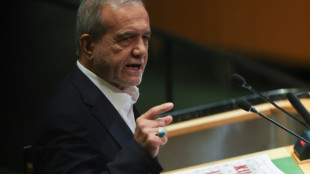 France, US tell Iran still chance to avoid nuclear sanctions
France, US tell Iran still chance to avoid nuclear sanctions
-
Big news: Annual eating contest roars to life in Fat Bear Week
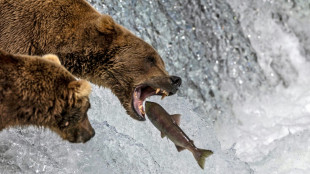
-
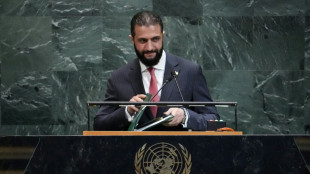 In UN debut, new Syria leader warns on Israel but backs dialogue
In UN debut, new Syria leader warns on Israel but backs dialogue
-
Malawi's ex-president Mutharika returns to power in crushing vote win
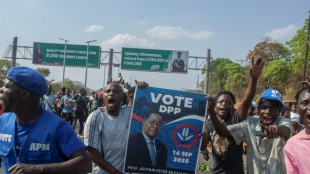
-
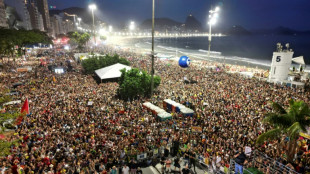 Under-fire Brazil senators scrap immunity bid
Under-fire Brazil senators scrap immunity bid
-
Morikawa calls on US Ryder Cup fans 'to go crazy'

-
 India see off Bangladesh to book Asia Cup final spot
India see off Bangladesh to book Asia Cup final spot
-
Rubio calls for Russia to stop the 'killing' in Ukraine
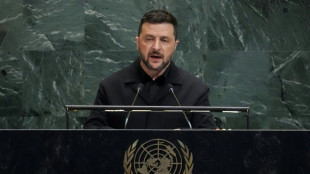
-
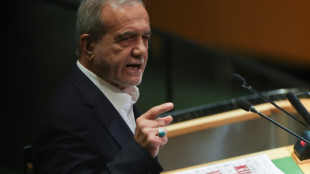 Macron tells Iran president only hours remain to avert nuclear sanctions
Macron tells Iran president only hours remain to avert nuclear sanctions
-
UN humanitarian chief slams impunity in face of Gaza 'horror'
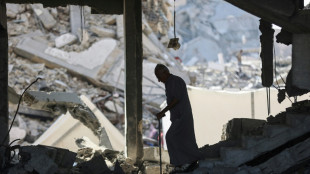
-
 Danish PM apologises to victims of Greenland forced contraception
Danish PM apologises to victims of Greenland forced contraception
-
Planetary health check warns risk of 'destabilising' Earth systems

-
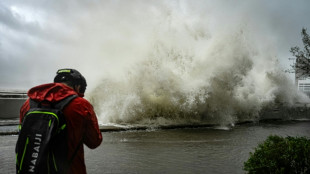 Typhoon Ragasa slams into south China after killing 14 in Taiwan
Typhoon Ragasa slams into south China after killing 14 in Taiwan
-
Monchi exit 'changes nothing' for Emery at Aston Villa
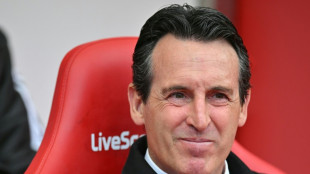
-
 Taiwan lake flood victims spend second night in shelters
Taiwan lake flood victims spend second night in shelters
-
Europe ready for McIlroy taunts from rowdy US Ryder Cup fans

-
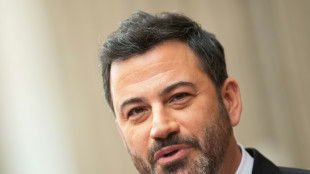 US comedian Kimmel calls Trump threats 'anti-American'
US comedian Kimmel calls Trump threats 'anti-American'
-
Australia win tense cycling mixed relay world title
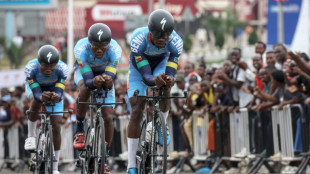
-
 Stokes will be battle-ready for Ashes, says England chief
Stokes will be battle-ready for Ashes, says England chief
-
Iran will never seek nuclear weapons, president tells UN
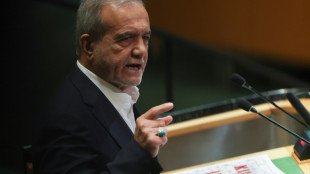
-
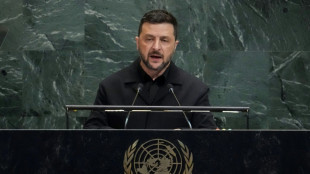 Zelensky says NATO membership not automatic protection, praises Trump after shift
Zelensky says NATO membership not automatic protection, praises Trump after shift
-
Becker regrets winning Wimbledon as a teenager
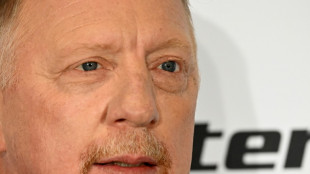
-
 'Mind-readers' Canada use headphones in Women's Rugby World Cup final prep
'Mind-readers' Canada use headphones in Women's Rugby World Cup final prep
-
Rose would welcome Trump on stage if Europe keeps Ryder Cup

-
 AI optimism cheers up markets following Fed rate warning
AI optimism cheers up markets following Fed rate warning
-
France doubles down on threat to build future fighter jet alone
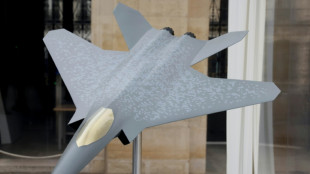
-
 Delay warning issued to fans ahead of Trump's Ryder Cup visit
Delay warning issued to fans ahead of Trump's Ryder Cup visit
-
EU chief backs calls to keep children off social media

-
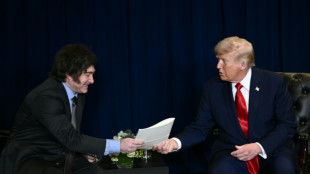 US Treasury says in talks to support Argentina's central bank
US Treasury says in talks to support Argentina's central bank
-
'Everything broken': Chinese residents in typhoon path assess damage
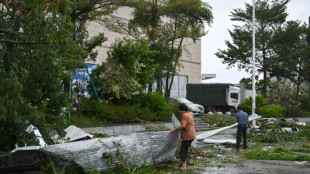
-
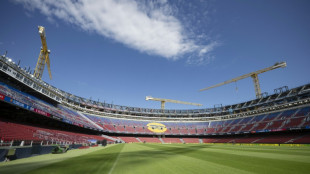 Inside Barcelona's Camp Nou chaos: What is happening and why?
Inside Barcelona's Camp Nou chaos: What is happening and why?
-
UK police arrest man after European airports cyberattack
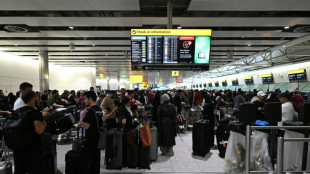
-
 Ballon d'Or disappointment will inspire Yamal: Barca coach Flick
Ballon d'Or disappointment will inspire Yamal: Barca coach Flick
-
French-German duo wins mega offshore wind energy project
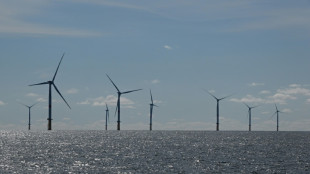
-
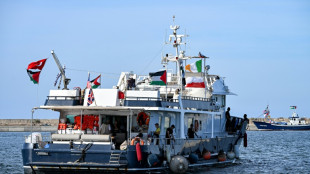 Italy deploys frigate after drone 'attack' on Gaza aid flotilla
Italy deploys frigate after drone 'attack' on Gaza aid flotilla
-
Typhoon Ragasa slams into south China after killing 17 in Taiwan
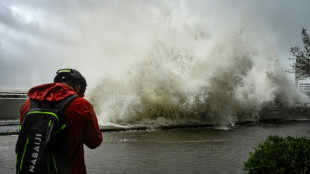
-
 NASA launches mission to study space weather
NASA launches mission to study space weather
-
Stocks torn between Fed rate warning, AI optimism

-
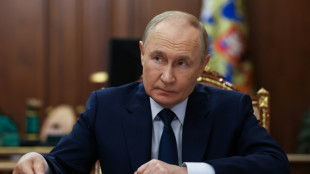 Russia vows to press offensive, rejects idea Ukraine can retake land
Russia vows to press offensive, rejects idea Ukraine can retake land
-
French consumer group seeks Perrier sales ban

-
 Photographer Arthus-Bertrand rejects image of 'fractured France'
Photographer Arthus-Bertrand rejects image of 'fractured France'
-
Gaza civil defence says dozens killed in Israeli strikes
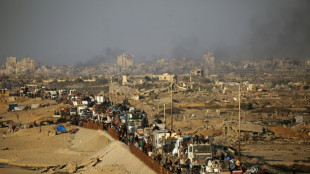
-
 Pakistan's Shaheen sends Asia Cup warning as third India clash looms
Pakistan's Shaheen sends Asia Cup warning as third India clash looms
-
Amazon to shut checkout-free UK grocery shops

-
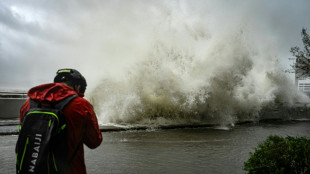 Typhoon Ragasa hits south China after killing 15 in Taiwan
Typhoon Ragasa hits south China after killing 15 in Taiwan
-
Russia vows to press on in Ukraine, rejects Trump jibe
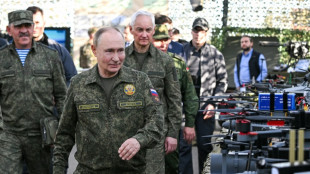
-
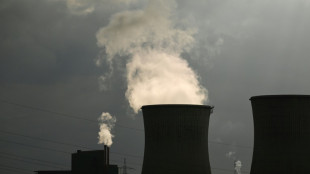 Germany's Merz rejects claims he is slowing green shift
Germany's Merz rejects claims he is slowing green shift
-
Sinner says 'changing a lot' after US Open loss to Alcaraz

-
 Russia-linked disinfo campaign targets Moldovan election
Russia-linked disinfo campaign targets Moldovan election
-
Danish PM to apologise to victims of Greenland forced contraception


Where is Iran's uranium? Questions abound after US strikes
After President Donald Trump bragged US strikes had "obliterated" Iran's nuclear capabilities, officials cautioned it was still too soon to assess the impact on the country's nuclear programme.
Many questions remain after Sunday's strikes, especially about the whereabouts of Iran's sensitive stockpile of uranium enriched to 60 percent -- a short step from the 90 percent required for a nuclear weapon.
- Where is Iran's enriched uranium? -
The US attacks, carried out by B-2 stealth bombers, targeted three Iranian nuclear sites: Isfahan and Iran's main enrichment plants in Fordo and Natanz.
While significant damage has been reported, the International Atomic Energy Agency (IAEA) has voiced concern about Iran's stockpile of near-weapons-grade uranium.
Tehran has an estimated 408.6 kilogrammes of uranium enriched to 60 percent, according to the UN nuclear watchdog, whose inspectors last saw that stockpile on June 10.
That material, if further refined, would theoretically be sufficient to produce more than nine nuclear bombs.
IAEA head Rafael Grossi on Monday demanded access to Iran's nuclear sites, saying the agency needs to "account for" the uranium stockpile.
Concerns about the fate of the sensitive stockpile have loomed large. On June 13, the day Israel began its Iran offensive, Iranian Foreign Minister Abbas Araghchi sent a letter to the IAEA, announcing the implementation of "special measures to protect nuclear equipment and material".
Days before the US attacked, satellite imagery showed vehicles near Fordo's entrance.
Prime Minister Benjamin Netanyahu said Israel had "interesting intelligence" on the matter, declining to elaborate.
Israel announced Monday it had carried out strikes to block access routes to Fordo.
"It will be difficult if not impossible to track down all of Iran's 60 percent enriched uranium, stored in small canisters that are easily transportable by car," Kelsey Davenport, an expert with the Arms Control Association, told AFP.
"They (Iranians) no longer have the capacity to turn that stockpile of highly enriched uranium to weapons-grade uranium, and that was really the goal there," US Vice President JD Vance told ABC News.
He added the Trump administration would deal with the uranium "in the coming weeks".
- Can Iran still make a nuclear bomb? -
Analysts have been treading carefully when addressing this issue.
Before the attacks, Iran had about 22,000 centrifuges -- the machines used to enrich uranium. Many of them were damaged when Natanz was hit, the IAEA head said.
Grossi also said "very significant damage" is expected to have occurred at Fordo, "given the explosive payload utilised and the extreme vibration-sensitive nature of centrifuges".
Experts however say that it is unclear how many centrifuges Iran has, with some of them believed to be stored at unknown locations.
With "60 percent enriched uranium and a few hundred advanced centrifuges, Iran still has the capability to weaponise, and now there is more political impetus to dash for a bomb", said Davenport.
- What are the proliferation risks? -
Before the conflict, the IAEA said it had "no indication" of the existence of a "systematic programme" in Iran to produce a nuclear weapon. But without access to nuclear sites, the agency no longer has oversight.
Grossi warned Monday that the "global non-proliferation regime that has underpinned international security... could crumble and fall", urging parties to return to diplomacy.
Iran ratified the nuclear non-proliferation treaty (NPT) in 1970, committing it to declare its nuclear material to the IAEA. But it has recently begun preparing the grounds for a possible withdrawal from the treaty, accusing the agency of acting as a "partner" in Israel's "war of aggression".
Reza Najafi, Iran's ambassador to the IAEA, said Monday the "unlawful act of aggression" by the United States had "delivered a fundamental and irreparable blow" to the non-proliferation regime.
"I do think there is a major risk that Iran withdraws from the NPT and expels inspectors, or simply does not provide them with access to key sites," said Eric Brewer of the US research institute Nuclear Threat Initiative (NTI).
He added that Iran could also "over time, build (a) covert" programme like North Korea, which withdrew from the NPT in 2003 and went on to become a nuclear-armed power.
F.Stadler--VB

